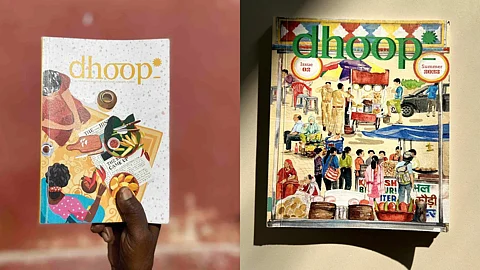
- HOMEGROWN WORLD
- #HGCREATORS
- #HGEXPLORE
- #HGVOICES
- #HGSHOP
- CAREERS
- ABOUT US
- CONTACT US

Not to be a cliched 90s girl, but every time I think of summer, I think of the West Life cover of the song Seasons in the Sun. “We had joy, we had fun, we had seasons in the sun” - it was a simple song written in the 60s that found a resurgence in the 90s, but its sentiments were unwavering. It talks of a life well lived, but the hook was always about the joys of frolicking in the sun, so to speak. Dhoop is a magazine with a sunny, summery disposition. It talks about gorging on mangoes in summer and carrying flavourful vadagam that was resolutely dried in the sun by a matriarch - a flavour bomb that the writer carries as a testament to family and a reminder of her home. There is something about sitting in the sunlight that truly makes one savour every last morsel and sip. It is therefore befitting that a niche innately Indian magazine that is driven by food enthusiasts would be called Dhoop - or Sunlight. For the founder, it drew from her memories of eating food in cold Jaipur winters with her mother, while sitting in the warm sunlight that seeped into the house and provided a comfortable respite.
Dhoop magazine analyses food in relation to every avenue that it intersects with - nature, culture, sustainability, design and community. Founded by Rini Singhi, Dhoop works to uncover the stories behind the food that we eat and work with those who share in their passion to narrate them. Having worked in a host of food-related companies over the course of her career that included everything from Greenr Cafe and Zomato to Goya Journal and Brick Oven, Rini was always drawn to the field of culinary in one way or another. But she wanted to look at it through a different lens and chanced upon the course offered by Rhode Island School of Design in liberal arts with a focus on nature, culture and sustainability.
Having always harboured a love for food, and with veritable food organisation-related experience on her side, Rini set about to learn more and do more with this course. During her time there, she studied food through the lens of these topics and also credits her time at RISD as when she learnt the impact of print publications on people. She talked about how visceral the experience of a real-life magazine can be in making people pause and critically analyse the content, as opposed to reading an article and forgetting about what it talked about. A grant provided by RISD towards this project is what also helped her to make this magazine a reality.
Rini saw that many existing publications talked about food through a deep yet singular lens. But she wanted to look at it in a layered, multidisciplinary way. The small but passionate team behind the magazine are all people who look at food as being more than sustenance, but rather a medium through which one can study the intricate relationship between all that makes life and the way it connects with the world. Dhoop is an annual magazine that takes its time throughout the year to find the right stories and develop them meticulously to reach more people and make an impact. The team behind each variant of the publication has been different - from the design to the contributors. Navya Shah - a graphic designer - is perhaps the only person other than the founder herself who has been part of both editions.
While the first edition of Dhoop followed the theme of the publication - the interplay of sunlight and the sun with regard to the world of food, the second issue looks at the theme of Commensality, or the act of eating together. Featuring stories, art, poems and ideas that critically analyse the facets of this topic, the magazine hopes to make people wonder and question the very concept of eating together. Currently, the people behind Dhoop magazine are taking a much-needed break and realigning themselves before the next issue.
In the meantime, they are also working towards bringing the second edition of the publication to more people. Even in terms of growth, Rini hopes that Dhoop can find its audience in the long term, but more importantly, she hopes that the publication becomes bigger than the team and builds a community of people who are passionate about the culinary world and its many connections to nature, sustainability and design. While you can purchase Dhoop magazine on their website, it is also currently available in person at the Pagdandi Bookstore in Pune and at the Kitchen Arts & Letters in Lexington, New York.
You can explore the world of Dhoop here.
If you enjoyed reading this, here's more from Homegrown:
‘Come Eat With Me’ Is A Celebration Of Dalit Cuisine, Identity & Caste
Experience The Regional Flavours Of India With These Homegrown Cookbooks
Cooking Beyond Compulsion: How Food Allows Indian Women To Explore Their Culture
